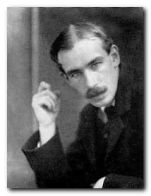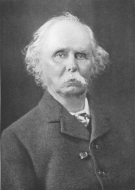----
I admit I came to Universal Man: The Seven Lives of John Maynard Keynes with a certain prejudice. I knew Richard Davenport-Hines as an accomplished writer and biographer. But he has no background in economics. How could he write a successful life of the most fascinating and influential economist of the 20th century, the economist who gave governments the tools to fight slumps? (Not that they always use them!)
Can one write an effective study of a supreme achiever in any sphere – whether it is mathematics, philosophy, literature, or tennis – without having some feel for the beauty of the idea for which they are trying to find the perfect expression?
True enough, Keynes was, as his Russian wife said, “more than economist”. But the “more” does not explain why Keynes is still a name to conjure with. What it might illuminate is the peculiar nature of his intellectual genius. But then we need to know what exactly it is that needs to be illuminated. Davenport-Hines is disarming about the absence of this essence. “This short book is notable for its technical omissions,” he writes. Not only is the economics omitted, but also the philosophy, which was its foundation.
He solves the problem of being unable to write a properly centred life of Keynes by writing seven lives: Keynes as Altruist, Boy Prodigy, Official, Public Man, Lover, Connoisseur, and Envoy: seven characters in search of a lead.
For example, he gives a splendid account of Keynes’s Economic Consequences of the Peace (1919), his polemic against the allied attempt to extract excessive debt payments (reparations) from the defeated Germans. But everything hinges on the meaning of “excessive”. Davenport-Hines has no problem with the morality of Keynes’s stand, but there is the technical question of Germany’s “capacity to pay”. The defence is incomplete without coming to a view on this. That the author is not fully possessed of Keynes’s intellectual world is also suggested by the slight misquotation of his most famous remark “in the long run we are all dead”, which he has as “in the long run in which we are all dead”.
This is the case for the prosecution. But there is also a strong case for the defence. Treating Keynes’s lives as interesting and valuable for their own sake, and not just as a means to his economics, gives them an extra vividness.
Davenport-Hines is right to root Keynes solidly in the culture of his time. Placing his economics in the context of Edwardian iconoclasm and postwar desolation is a powerful corrective to the standard view of economics as an axiomatic system of universal truths.
With a keen eye for telling detail and social connections, Davenport-Hines brilliantly conveys what one might call the peripheral atmospherics of Keynes’s existence. For example, he finds a literary source for Keynes’s memoir, Dr Melchior, in the Davout-Pierre Bezukhov exchanges of War and Peace: “Keynes probably knew this passage from his mother’s reading aloud of Tolstoy.” On the other hand, the author is curiously blind to the influence of Freud on Keynes’s views about money.
And, finally, Davenport-Hines captures crucial aspects of Keynes’s personality – his generosity of spirit, his optimism, his knack for friendship, his ethical and aesthetic standards, his playfulness, his freedom from cant, his liberal-mindedness, as well as his intellectual arrogance – which emerge only fitfully in his economic treatises, but which colour their standpoint. Keynes was proud of his civilisation, and wanted to preserve it. It’s something that marks out his generation from ours, just as his sense of duty – of which the author might have made more – links his group of Edwardians with their Victorian forbears.
Yet there is an inherent disconnect built into the “seven lives” structure. Patterns of thought and activity which form part of a single whole are split into topics. Shorn of their lateral connections, the topics tend to become lists. The division also makes it difficult to get a sense of how Keynes matured over his lifetime. He was not the same person at 50 as he had been at 20.
Davenport-Hines says that Keynes compartmentalised his lives. But “compartmentalisation” is a figure of speech, and in practice, one thing leads into another. In chapter four, The Public Man, Davenport-Hines writes that Keynes had “no ethical dispute with capitalism”. And so one might suppose from a chapter devoted to the succession of his public appointments. One would not gather that he hoped that before long “love of money” would be consigned to “specialists in mental disease”. This disobliging thought comes only later, in the discussion of Keynes as a connoisseur.
My hero John Maynard Keynes, by Joan Bakewell
Read more
The disconnect is particularly acute when we come to The Lover. “Keynes’s sex life,” writes Davenport-Hines, “was one of the seven activities that made him a universal man.” Presumably, he means by this that Keynes was bisexual. Between 1906 and 1916 – that is, between the ages of 23 and 33 – he kept a tally of his lovers (all male), both friends and pick-ups, together with frequency of copulation. The list of his pick-ups starts with “Stable Boy at Park Lane” and ends with “Grand Duke Cyril of the Paris Baths”. Given that there were many more copulations (200) than pick-ups (23), most of them must have been with his friends, especially Duncan Grant, the first great consummated love of his life. Davenport-Hines’s vivid history of Edwardian cruising habits and venues seems out of proportion to Keynes’s modest tally of one-night stands. Then in his late 30s, he fell in love with the ballerina, Lydia Lopokova, and didn’t sleep with men again.
As the author points out, many of Keynes’s gay friends “settled down” and married in early middle age. Today our only way of understanding these marriages is as disguises, which current law has sought to make unnecessary by making it legal for gay people to marry. But who knows whether Keynes found sex with Duncan Grant more satisfying than sex with Lydia. The fact is that at a certain point in his life he fell in love with Lydia and wanted to spend the rest of his life with her.
Keynes’s gay adventures tell one nothing directly about his economics. But his lack of guilt about them does tell us a great deal about his youthful attitude to the conventional morality of his day, of which Victorian economics were a part. His rejection of the “duty to save”, which he called “nine-tenths of morality”, was intellectual iconoclasm rooted in moral iconoclasm.
In the end it is useless to protest that practically all of this material is already known, that what made Keynes really great is left out. It may be that the only way to bring icons of the past to life is to repackage them for current consumption. This, Davenport has done with grace and insight.
Robert Skidelsky’s Five Years of Economic Crisis is published by the Centre for Global Studies.
Universal Man is published by William Collins (£18.99). Click here to buy it for £15.19
A Soaring Eagle: Alfred Marshall 1842-1924 [Paperback] Peter Groenewegen (Author)
Abstract
Since Keynes's masterful obituary, knowledge of Marshall's life has greatly increased. Family and social background, early philosophical and economic writings, and involvement with educational reforms are subjects on which readers now enjoy the benefits of better and more reliable information. By itself, this would have made an extensive biography worth its while Groenewegen's book goes much further, adding new discoveries, discussing Marshall's heritage, and endeavoring to provide a coherent whole in order to preserve "Marshall's social philosophy." Though digressions make it somewhat difficult to concentrate attention on any one connecting thread, the book offers a balanced and informed treatment of Marshall's life and activities. This article examines the book's merits and limitations and points out some hidden aspects of Marshall's character and research programs.
Fulltext Preview
Editorial Reviews
Review
'. . . Groenewegen's prose is gripping yet lucid and analytical. Without exaggeration it can be stated that any future work on Marshall has to start from this book.' - CJ Talele, Choice, November 1995, Vol. 33 No. 3 -- CJ Talele, Choice , November 1995, Vol. 33 No. 3
'A scholarly and comprehensive study of Marshall's life and work, particularly interesting on his early background.' - John K. Whitaker, Bankard Professor of Economics, University of Virginia -- John K. Whitaker, Bankard Professor of Economics, University of Virginia
'Given his worldwide reputation and immense influence on 20th century economics, the absence of a scholarly biography of Alfred Marshall is shocking. Now, at last, Peter Groenewegen has filled this yawning gap, and his book is a major event for economists, intellectual historians and students of the social sciences. Groenewegen's research, extending over many years, has been exhaustive; his contribution to our knowledge of the man and his works is immense; his analysis of Marshall's writings is comprehensive; and throughout his judgment is balanced and insightful. This is truly a landmark achievement.' - AW Coats, Duke University and University of Nottingham, UK -- AW Coats, Duke University and University of Nottingham, UK
'Scholars will find themselves well rewarded for their time reading Peter Groenewegen's substantial contribution to scholarship. No good library can afford to be without this book. It is a wonderful achievement that has been long awaited.' - Robert W. Butler, The Historian, Spring 1997, Vol. 59 No. 3 -- Robert W. Butler, The Historian , Spring 1997, Vol. 59 No. 3
'A scholarly and comprehensive study of Marshall's life and work, particularly interesting on his early background.' - John K. Whitaker, Bankard Professor of Economics, University of Virginia -- John K. Whitaker, Bankard Professor of Economics, University of Virginia
'Given his worldwide reputation and immense influence on 20th century economics, the absence of a scholarly biography of Alfred Marshall is shocking. Now, at last, Peter Groenewegen has filled this yawning gap, and his book is a major event for economists, intellectual historians and students of the social sciences. Groenewegen's research, extending over many years, has been exhaustive; his contribution to our knowledge of the man and his works is immense; his analysis of Marshall's writings is comprehensive; and throughout his judgment is balanced and insightful. This is truly a landmark achievement.' - AW Coats, Duke University and University of Nottingham, UK -- AW Coats, Duke University and University of Nottingham, UK
'Scholars will find themselves well rewarded for their time reading Peter Groenewegen's substantial contribution to scholarship. No good library can afford to be without this book. It is a wonderful achievement that has been long awaited.' - Robert W. Butler, The Historian, Spring 1997, Vol. 59 No. 3 -- Robert W. Butler, The Historian , Spring 1997, Vol. 59 No. 3
Product Description
This biography of Alfred Marshall places the major features of the subject's life and work within the rich institutional setting of late 19th-century and early 20th-century Britain. It reveals why he decided to study economics and the background to his important books.
Product Details
- Paperback: 912 pages
- Publisher: Edward Elgar Pub; 1 Ed edition (January 1998)
- Language: English
75萬字中幾乎沒一字母的純粹翻譯無索引無參考書
翱翔的鷹-阿爾弗雷德·馬歇爾傳
作者:(澳)格羅尼維根著出版社:華夏出版社出版時間:2011-1-1 版次:1頁數:568字數:756000
阿爾弗雷德·馬歇爾是經濟學理論家,實踐家、教育家,可謂開職業經濟學家之先河。他的生平和職業生涯需要一部全景式的傳記,以更深入地探究其工作的來龍去脈,更全面地揭示其思想的深遠影響。
彼得·格羅尼維根最新撰寫的這部巨著從英國19世紀末20世紀初的社會制度背景出發,探討了馬歇爾工作和生活的主要方面。這部傳記披露了很多鮮為人知的內容,展示了馬歇爾作為重要的經濟學家的生活,介紹了他早年在劍橋所受的經濟學和數學教育,記述了在社會主義,帝國主義、自由貿易、?生學、宗教信仰、社會福利和女性運動等問題上與同時代人的爭論。作為阿爾弗雷德·馬歇爾的第一部傳記,《翱翔的鷹》不僅對經濟學說史、社會科學史、教育史貢獻良多,還從多個角度深入反映了維多利亞時代和愛德華時代的英國社會。
前言
第1章阿爾弗雷德。馬歇爾的生平:引言及概論
第2章家庭和世系
第3章童年和校園生活(1842~1861年)
第4章在聖約翰學院的本科生涯(1861~1865年)
第5章職業探索之路( 1865~1872年):聖約翰學院的講師歲月
第6章經濟學學徒(1867~1875?)及之後的學術生涯(1876~1879年)
第7章善察好學者之旅:歐洲、英國和美國
第8章丈夫和不同尋常的伙伴
第9章最初的學術生涯(1868~1884年):劍橋、布里斯托爾和牛津
第10章劍橋大學教授(1885~1908年)
第11章向政府提議( 1886~1908年)
第12章《經濟學原理》的漫長征途(1881~1922年)
第13章據理力爭的辯駁者和擁護者
第14章一位理想的女權主義者
第一章阿爾弗雷德·馬歇爾的生平:引言及概論
阿爾弗雷德。馬歇爾,現代英國經濟學之父及劍橋經濟學派的創始人,生於1842年7月26日,倫敦19世紀中期一個極平常的夏日。這一天,在坐落於西敏的英國國會上議院和下議院,國會議員們忙著三讀關於殖?地乘客與評估稅(2號)的法案,審議教區委員的報告,並對內閣大臣進行質詢。威靈頓的公爵在上議院介紹了二讀貧民法的修正法案。在溫莎,維多利亞女王和阿爾伯特王子利用下午時光在公園裡騎車;晚上華麗的晚宴宴請了夏洛特·鄧達斯女士、查爾斯·韋爾斯伯爵、公主殿下、公爵夫人和庫珀爵士。在鄰近的伊頓,市長為近百名來賓舉辦了隆重的宴會,以此結束他之前的一系列“競選演說”。法庭上,副大法官約翰·威格拉姆先生決定幫助原告解決長期以來的婚姻財產問題;薩里郡的驗屍官卡特先生處於興奮狀態。他正對前一天在沃普通西南鐵路工作的工人約翰.米歇爾的死亡案件進行著審訊。迪斯科德·梅洛迪贏得了古德伍德賽的克雷文賭注;上議院一年一度的板球比賽,即11個紳士和11個專業球員的對決正處於第二天的較量之中;在甘草市場的皇家劇院,謝里丹的《對手》正在上演;代維吉士皇家薩里劇院也在上演貝里尼1831年的歌劇《夢遊女》,下一場上演的是莎士比亞的《麥克白》,之後,整個歌劇團在斯坦斯伯里先生的指揮下演唱了所有洛克的女巫曲目。這些都是普通的事情,但是卻標誌著馬歇爾來到了這個世界。
它們還標誌了馬歇爾不平凡一?的開始。在走了一些彎路之後,馬歇爾最終成為一位著名的經濟學家。他撰寫的《經濟學原理》是經濟學領域使用時間最長的教材之一,他還出版了另外幾本著作,不過相比之下受到的關注較少。他是劍橋經濟學派的創始人,並建立了英國新;古典主義經濟學這樣一個獨特的分支,將早期的古典主義思想和新邊際主義經濟思想結合起來,並在供給和需求的基礎上將二者融合成一種新的框架。
……
阿爾弗雷德。馬歇爾,現代英國經濟學之父及劍橋經濟學派的創始人,生於1842年7月26日,倫敦19世紀中期一個極平常的夏日。這一天,在坐落於西敏的英國國會上議院和下議院,國會議員們忙著三讀關於殖?地乘客與評估稅(2號)的法案,審議教區委員的報告,並對內閣大臣進行質詢。威靈頓的公爵在上議院介紹了二讀貧民法的修正法案。在溫莎,維多利亞女王和阿爾伯特王子利用下午時光在公園裡騎車;晚上華麗的晚宴宴請了夏洛特·鄧達斯女士、查爾斯·韋爾斯伯爵、公主殿下、公爵夫人和庫珀爵士。在鄰近的伊頓,市長為近百名來賓舉辦了隆重的宴會,以此結束他之前的一系列“競選演說”。法庭上,副大法官約翰·威格拉姆先生決定幫助原告解決長期以來的婚姻財產問題;薩里郡的驗屍官卡特先生處於興奮狀態。他正對前一天在沃普通西南鐵路工作的工人約翰.米歇爾的死亡案件進行著審訊。迪斯科德·梅洛迪贏得了古德伍德賽的克雷文賭注;上議院一年一度的板球比賽,即11個紳士和11個專業球員的對決正處於第二天的較量之中;在甘草市場的皇家劇院,謝里丹的《對手》正在上演;代維吉士皇家薩里劇院也在上演貝里尼1831年的歌劇《夢遊女》,下一場上演的是莎士比亞的《麥克白》,之後,整個歌劇團在斯坦斯伯里先生的指揮下演唱了所有洛克的女巫曲目。這些都是普通的事情,但是卻標誌著馬歇爾來到了這個世界。
它們還標誌了馬歇爾不平凡一?的開始。在走了一些彎路之後,馬歇爾最終成為一位著名的經濟學家。他撰寫的《經濟學原理》是經濟學領域使用時間最長的教材之一,他還出版了另外幾本著作,不過相比之下受到的關注較少。他是劍橋經濟學派的創始人,並建立了英國新;古典主義經濟學這樣一個獨特的分支,將早期的古典主義思想和新邊際主義經濟思想結合起來,並在供給和需求的基礎上將二者融合成一種新的框架。
……


沒有留言:
張貼留言
注意:只有此網誌的成員可以留言。